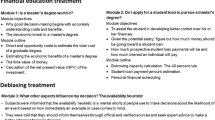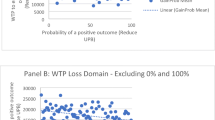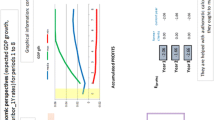Abstract
We examined the influence of feedback regarding alternatives on risk aversion and willingness to compromise in student loan negotiations. In a simulated negotiation, participants in the roles of bank advisors and clients received feedback about alternative offers either only after an impasse of the negotiation, or regardless of outcome. When receiving feedback only after an impasse, participants tried to avoid the regret-eliciting feedback and therefore set less ambitious goals and showed higher willingness to compromise. In particular, they set a less ambitious reservation price and estimated a less beneficial ‘best alternative to negotiated agreement’. When analyzing the process of the negotiation, we found that they made less favorable offers more quickly and arrived at less favorable final offers. They sacrificed their previously set goals by violating their reservation prices and underbidding their estimated ‘best alternative to negotiated agreement’ more often. Therefore, they showed a higher potential for agreement with the other party, but at the cost of less favorable outcomes. Results indicate that anticipated regret could contribute to suboptimal negotiation outcomes in the context of student loans, which might lead to long term dissatisfaction.
Similar content being viewed by others
References
Autio M, Wilska TA, Kaartinen R, Lähteenmaa J (2009) The use of small instant loans among young adults—a gateway to consumer insolvency. Int J Consum Stud 33: 407–415
Barry B (2008) Negotiator affect: the state of the art (and the science). Group Decis Negot 17: 97–105
Barry B, Oliver RL (1996) Affect in dyadic negotiation: a model and propositions. Organ Behav Hum Dec 67: 127–143
Bell DE (1982) Regret in decision making under uncertainty. Oper Res 5: 960–981
Brendl CM, Higgins ET (1996) Principles of judging valence: what makes events positive or negative?. In: Zanna MP (ed) Advances in experimental social psychology, vol 28. Academic Press, New York, pp 95–160
Brown S, Taylor K, Price SW (2005) Debt and distress: evaluating the psychological cost of credit. J Econ Psychol 26: 624–663
Chen H, Volpe RP (1998) An analysis of personal financial literacy among college students. Financ Services Rev 7: 107–128
Connolly T, Reb J (2003) Omission bias in vaccination decisions: where’s the “omission”? Where’s the “bias”?. Organ Behav Hum Dec 91: 186–202
Davies E, Lea SEG (1995) Student attitudes to student debt. J Econ Psychol 16: 663–679
De Dreu DKW, Weingart LR, Kwon S (2000) Influence of social motives on integrative negotiation: a metaanalytic review and test of two theories. J Pers Soc Psychol 78: 889–905
Druckman D (1994) Determinants of compromising behavior in negotiation. J Conflict Resolut 28: 507–556
Druckman D, Olekalns M (2008) Emotions in negotiations. Group Decis Negot 17: 1–11
Fisher R, Ury W (1981) Getting to yes: negotiating agreement without giving in. Houghton Mills, Boston
Flint TA (1997) Predicting student loan defaults. J High Educ 68: 322–354
Forgas JP (1998) On feeling good and getting your way: mood effects on negotiator cognition and bargaining strategies. J Pers Soc Psychol 74: 565–577
Gruder CL (1971) Relations with opponent and partner in mixed-motive bargaining. J Conflict Resolut 15: 403–416
Haultain S, Kemp S, Chernyshenko OS (2010) The structure of attitudes to student debt. J Econ Psychol 31: 322–330
Hayhoe CR, Leach L, Turner PR (1999) Discriminating the number of credit cards held by college students using credit and money attitudes. J Econ Psychol 20: 643–656
Hayhoe CR, Leach L, Allen MW, Edwards R (2005) Credit cards held by college students. Financ Counsel Plan 16(1): 1–10
Hetts JJ, Boninger DS, Armor DA, Gleicher F, Nathanson A (2000) The influence of anticipated counterfactual regret on behavior. Psychol Market 17: 345–368
Hoelzl E, Pollai M, Kamleitner B (2009) Experience, prediction and recollection of loan burden. J Econ Psychol 30: 446–454
Josephs RA, Larrick RP, Steele CM, Nisbett RE (1992) Protecting the self from the negative consequences of risky decisions. J Pers Soc Psychol 62: 26–37
Jones JE (2005) College students’ knowledge and use of credit. Finan Counsel Plan 16(2): 9–16
Kardes FR (1994) Consumer judgment and decision processes. In: Wyer RS, Srull TK (eds) Handbook of social cognition, vol 2, 2nd edn. Lawrence Erlbaum Associates, Hillsdale, pp 399–466
Larrick RP (1993) Motivational factors in decision theories: the role of self-protection. Psychol Bull 113: 440–450
Larrick RP, Boles TL (1995) Avoiding regret in decisions with feedback: a negotiation example. Organ Behav Hum Dec 63: 87–97
Lemon KN, White TB, Winer RS (2002) Dynamic customer relationships: incorporating future considerations into the service retention decision. J Market 66: 1–14
Lewis A, van Venrooij M (1995) A note on the perceptions of loan duration and repayment. J Econ Psychol 16: 161–168
Loomes G, Sugden R (1982) Regret theory: an alternative theory of rational choice under uncertainty. Econ J 92: 805–824
Magee JC, Galinsky AD, Gruenfeld DH (2007) Power, propensity to negotiate, and moving first in competitive interactions. Pers Soc Psychol Bull 33: 200–212
Pieters R, Zeelenberg M (2005) On bad decisions and deciding badly: when intention-behavior inconsistency is regrettable. Organ Behav Hum Dec 97: 18–30
Raiffa H (1982) The art and science of negotiation. Harvard University Press, Cambridge
Reb J (2008) Regret aversion and decision process quality: effects of regret salience on decision process carefulness. Organ Behav Hum Dec 105: 169–182
Richard R, Vander Pligt J, De Vries NK (1996) Anticipated regret and time perspective: changing sexual risk-taking behavior. J Behav Decis Making 9: 185–199
Ritov L, Baron J (1995) Outcome knowledge, regret and omission bias. Organ Behav Hum Dec 64: 119–127
Roberts JA, Jones E (2001) Money attitudes, credit card use, and compulsive buying among American college students. J Consum Aff 35: 213–240
Simonson I (1992) The influence of anticipating regret and responsibility on purchase decisions. J Consum Res 19: 105–118
Stuhlmacher AF, Champagne MV (2000) The impact of time pressure and information on negotiation process and outcome. Group Decis Negot 9: 471–491
Thompson LL, Wang J, Gunia BC (2010) Negotiation. Annu Rev Psychol 61: 491–515
Van Lange P, Schippers M, Balliet D (in press) Who volunteers in psychology experiments? An empirical review of prosocial motivation in volunteering. Pers Indiv Differ doi:10.1016/j.paid.2010.05.038
Wang J, Xiao JJ (2009) Buying behaviour, social support and credit card indebtedness of college students. Int J Consum Stud 33: 2–10
Warwick J, Mansfield P (2000) Credit card consumers: college students’ knowledge and attitude. J Consum Mark 17: 617–626
White TB, Lemon KN, Hogan JE (2007) Customer retention when the customer’s future usage is uncertain. Psychol Market 24: 849–870
Zeelenberg M, Beattie J (1997) Consequences of regret aversion 2: additional evidence for effects of feedback on decision making. Organ Behav Hum Dec 72: 63–78
Zeelenberg M, Pieters R (2004) Consequences of regret aversion in real life: the case of the Dutch postcode lottery. Organ Behav Hum Dec 93: 155–168
Zeelenberg M, Pieters R (2007) A theory of regret regulation 1.0. J Consum Psychol 17: 3–18
Zeelenberg M, Beattie J, Vander Pligt J, De Vries NK (1996) Consequences of regret aversion: effects of expected feedback on risky decision making. Organ Behav Hum Dec 65: 148–158
Author information
Authors and Affiliations
Corresponding author
Rights and permissions
About this article
Cite this article
Hoelzl, E., Hahn, L., Pollai, M. et al. The Effect of Feedback on Process and Outcome of Loan Negotiations: Consequences on Risk Aversion and the Willingness to Compromise. Group Decis Negot 22, 541–559 (2013). https://doi.org/10.1007/s10726-012-9282-x
Published:
Issue Date:
DOI: https://doi.org/10.1007/s10726-012-9282-x




